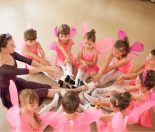Drama is a good way for children to develop self confidence and skills for working alongside others. Drama is a fun activity which can be started at any age.
What is Drama?
Quite simply, drama is a platform for actors of all ages to perform. It comes from the Greek verb ‘opav’ which translates to ‘do to’ or ‘action’.
Drama can be performed through a variety of media, including live performance, stage, film and television.
Drama can take the form of plays, with dialogue, scenes and stage directions, or combine with music and dance. These can take the form of operas, which are sung throughout the entire performance, or musicals, which combine dialogue and songs.
The most usual form of drama is entertainment, such as theatre or shows. However drama can also be used as an educational activity or for therapeutic purposes.
Where do you learn Drama?
Depending on when the young person starts their drama training and whether they are considering a serious acting career or perhaps only interested in more social roles with local operatic or musical groups, there are various training facilities available throughout the country to cater for all expressions of interest.
Options range from fine-tuning well established acting skills to simply providing people of all ages the opportunity to explore their creative and artistic sides.
Most primary and secondary schools around New Zealand offer drama as a subject in their curriculum. College students can gain qualifications through performance-based subjects including drama.
For the youngsters, many centres around the country have a children’s theatre within their performing arts circles. These are a great place for budding thespians or actors and actresses to develop their acting, singing and dancing skills.
For teenagers completing their secondary education and looking at tertiary options, and who are considering drama as a possible career choice, New Zealand boasts several drama schools and academies, mostly in the main centres. Entry is usually by audition. A list of academies, schools and theatre groups are included in this section.
Theatre and drama workshops are another opportunity for youngsters and adults alike to learn drama and performance skills from seasoned professionals. Workshops range from one day in duration to a weekend workshop or may run week long during school holidays.
What age can your child start Drama?
Many drama schools include classes for children aged 5 – 6 years and upwards. Usually there are also advanced classes for teens or those who have progressed from a young age through the school’s training facility. Some cater for preschoolers with creative classes.
Of course, preschools, primary and secondary schools perform musicals and plays throughout the year, and these are a great way for your child to either get a start in musical theatre or, if they are currently studying drama, perhaps a shot at a lead role. Great experience either way.
How do you progress over time?
Many of the younger preschool classes run by drama academies encourages development of the child’s imagination. This is combined with creative movement and the fundamentals in dance and music through role-playing, story telling and visual arts.
For children aged around 5 – 9 years, the classes tend to develop where the young person begins acting out fictional situations. Social interaction and self-expression skills are enhanced, often combined with basic dance and musical routines. Students gain skills and confidence in expressing their unique creative selves.
Preteens, 10 – 12 years, usually start to develop drama and theatrical skills, where they begin to create and build characters. This includes voice development, essential in acting of any sort, with an emphasis on clarity and projection. Performance skills are honed through work on the young persons stage technique.
Teenagers, 13 – 18 years, includes specialist training in theatre, stage and production. This will include participation in a stage show, often produced on a semi-professional basis, assisted and directed by professionals, and usually including full stage lighting, sound and music. This can be an exhilarating experience for the young adult and create artistic directions they may follow, as they consider tertiary training options.
What equipment do you need for Drama?
The ‘equipment’ you or your child needs when considering following a career or artistic path is intangible – creativity, desire, motivation, persistence and self-confidence. These will develop as acting skills develop, but a fundamental desire to embrace the arts and express oneself creatively is essential.
How much does Drama cost?
The costs associated with drama as a performing art vary considerably. Tuition fees vary according to the age group, experience level of the tutor(s) and class duration (e.g. workshop or term-long class).
There may be others costs involved if additional voice, dance, or musical training is required. You will also need to consider the costs of such things as costumes when your child reaches performance level, as these are usually in addition to tuition fees.
In the first instance, decide which is the best option to encourage your child’s artistic pursuits, then check around to see what schools, academies and children’s theatre groups are available. Also check websites to see who the tutors are and their backgrounds, training and experience (which is usually very high). If you’re paying reasonable fees for tuition you want to ensure you and your child are receiving a high calibre of tutor.
How much time does it take to learn Drama?
As with developing any new skill, daily practise is required. This includes studying other actors, plus, depending upon age and experience, many actors and actresses also study voice, music and dance as they broaden their creative base.
Once a person becomes involved with a stage show or theatre production, be prepared to put in some long hours in the evenings and weekends over a period of several weeks as the production takes shape.
Great Drama Websites
www.educationindex.com/theater/
Performing Arts Resources – an excellent source of information for actors, actresses, parents, teachers and tutors. Includes links to websites featuring, theatre, film, television, Broadway and costuming.





